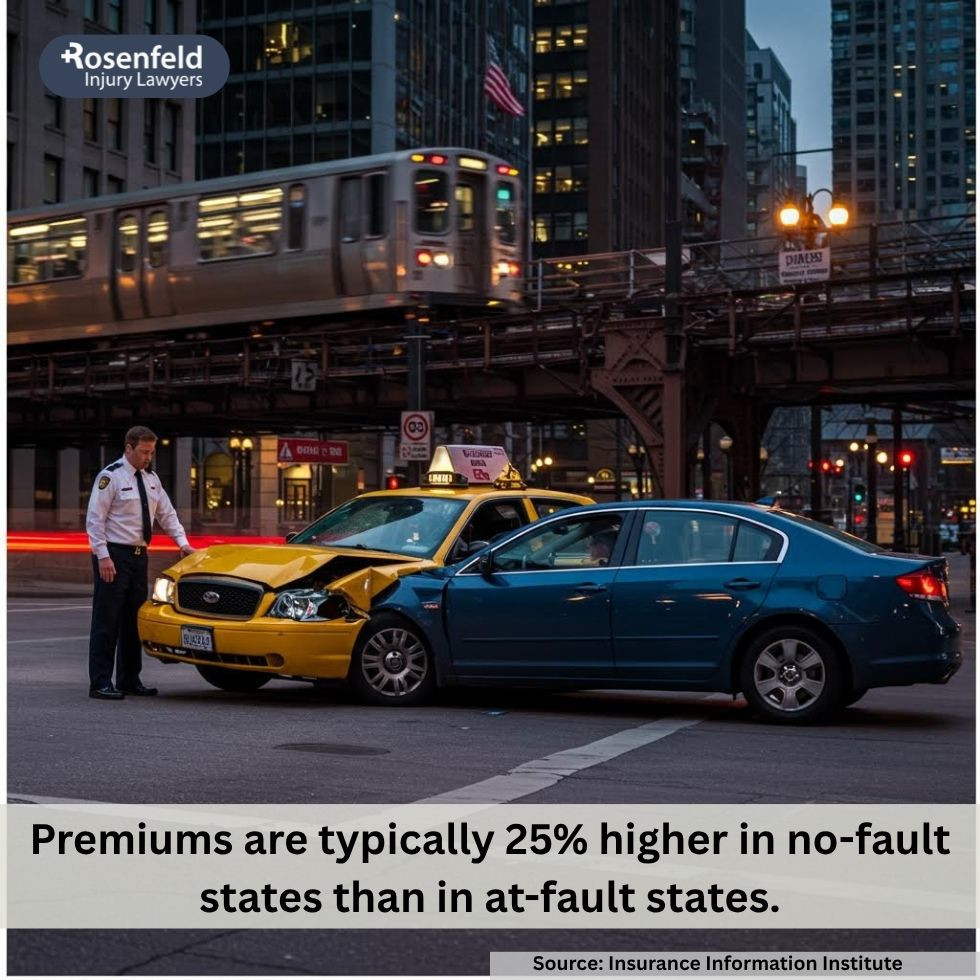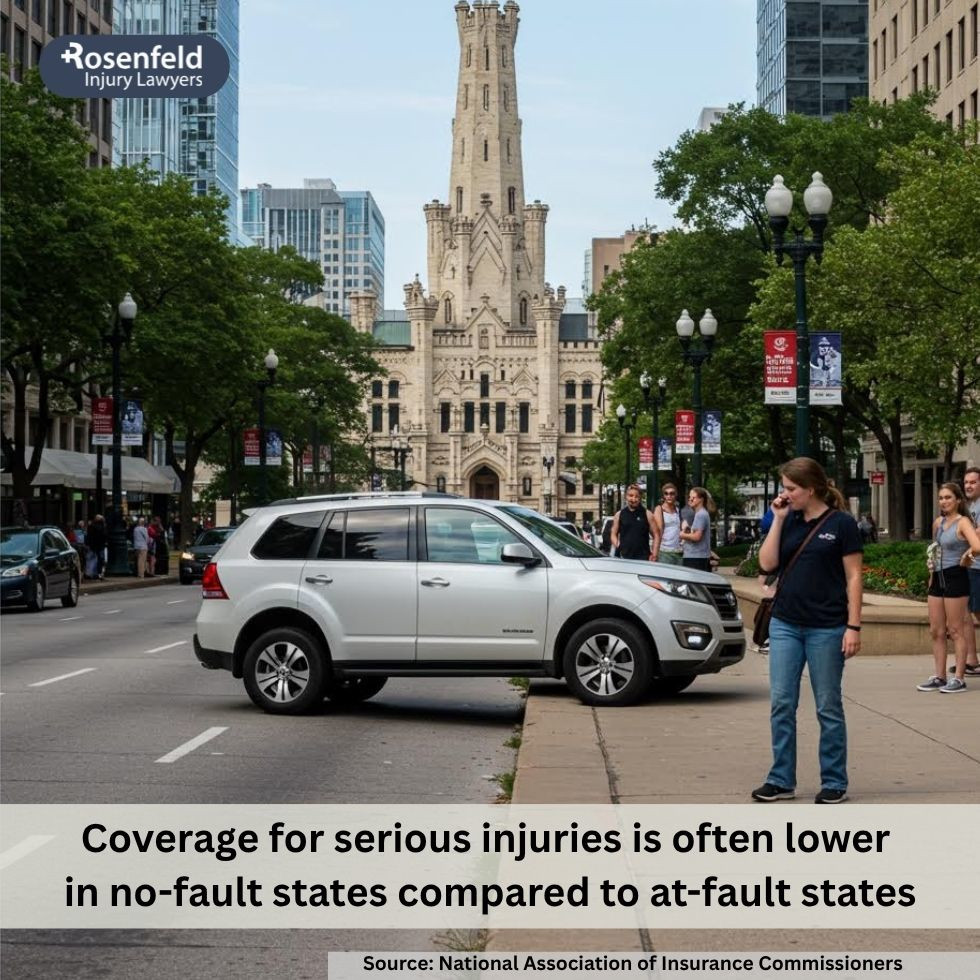- 24/7 Free Consultation: (888) 424-5757 Tap Here To Call Us
Car Accident Cases in at-Fault Vs No-Fault States

Understanding the difference between at-fault vs no-fault states is key to protecting your rights after a car accident. Whether you’re seeking compensation for medical bills, property damage, or lost wages, your state’s insurance system rules determine how you file a claim and who pays.
Our Chicago car accident lawyers explain the difference between fault insurance and no-fault insurance, what system Illinois follows, and how it affects your ability to recover damages. We’ll also discuss the steps to protect yourself after an accident under at-fault insurance laws.
What Is the Difference Between No-Fault vs. At-Fault States?
The primary difference between no-fault states and at-fault states is how injury claims are handled after an accident.
In no-fault states, each driver files a claim with their own insurance company to cover medical expenses, regardless of who caused the accident. These states require Personal Injury Protection (PIP) coverage, which helps pay for minor injuries but often limits your ability to sue the other driver unless your damages exceed a specific threshold.
In at-fault states, the at-fault driver’s insurance is responsible for covering the injured parties’ losses. This system allows victims to file a personal injury claim directly against the negligent driver, and it typically gives more flexibility to recover non-economic damages like pain and suffering.

Advantages and Disadvantages of At-Fault and No-Fault Systems
Both at-fault and no-fault insurance systems aim to streamline the claims process and compensate accident victims, but they do so differently.
In at-fault states, one of the biggest advantages is the ability to pursue full compensation from the negligent driver. This includes not just medical expenses and property damage but also non-economic damages like pain and suffering. It also promotes accountability, holding the at-fault driver financially responsible.
However, the process can take longer because the fault must be investigated and proven before a settlement is offered.
In contrast, no-fault states prioritize speed and simplicity. Victims file claims with their own insurance regardless of who caused the crash, often leading to quicker payouts and fewer legal battles. This system can reduce the need for lawsuits in minor accidents, which helps ease court backlogs.
However, there are drawbacks: PIP coverage may not fully compensate serious injury victims, and strict limits on the right to sue can make it difficult to recover full damages. Additionally, mandatory PIP coverage can lead to higher insurance premiums for drivers.
How Car Insurance Works in At-Fault States Like Illinois
Illinois is an at-fault state, meaning the at-fault driver’s insurance is responsible for paying the damages in a car accident. If you’re injured or your property is damaged, you can file a claim directly against the at-fault party’s insurer.
Bodily Injury Liability: Pays for the other party’s medical expenses if you caused the crash.
Property Damage Liability: Covers repairs to the other party’s car or other property.
Illinois Minimum Insurance Requirements: Illinois requires all drivers to carry minimum liability insurance. As of now, those minimums include:
- $25,000 for bodily injury per person;
- $50,000 total for bodily injury per accident;
- $20,000 for property damage per accident.
Drivers can also carry uninsured/underinsured motorist coverage and optional collision coverage to pay for their own damages, but proving fault is still key to maximizing recovery.

Illinois as an At-Fault State and What That Means for Your Auto Insurance Claim
Because Illinois is an at-fault insurance state, you’ll need to prove that the other driver caused the accident to recover compensation. Insurance adjusters use accident reports, witness statements, and physical evidence to determine liability.
Illinois follows a modified comparative negligence rule (735 ILCS 5/2-1116), also called the 51% bar rule. Under this system:
- If you are 51% or more at fault, you cannot recover damages.
- If you are less than 51% at fault, your recovery is reduced by your percentage of fault.
For example, if your damages are $100,000 and you’re found 20% at fault, you can still recover $80,000. This means even partial fault doesn’t bar recovery, but reduces your compensation. Working with an experienced attorney is essential to protect your claim.
Why At-Fault Insurance Rules Matter After a Car Accident in Illinois
In Illinois, which follows an at-fault insurance system, determining who caused the crash impacts nearly every part of your car accident claim. The party deemed responsible will be financially liable for the damages, so insurance companies conduct detailed investigations to assign fault.
That outcome affects how much compensation you receive—and from whom. For example, if the other driver is found liable, you’ll file a liability claim with their insurer. If you’re at fault, your collision coverage may be your only option.
Even casual remarks at the scene, such as “I’m sorry,” can be interpreted as an admission of fault and used against you later. These missteps can lower your settlement or give the insurance company a reason to deny your claim.
To protect your rights, avoid discussing fault with anyone and contact a car accident attorney as soon as possible. An experienced lawyer can manage communication, preserve evidence, and ensure you don’t unintentionally damage your case.
Talk to a Chicago Car Accident Lawyer About Your Fault-Based Claim
If you were injured in a car accident in Illinois, understanding how fault impacts your case is essential, and having a skilled attorney on your side can make all the difference.

At Rosenfeld Injury Lawyers, our team is experienced in handling fault-based claims and can step in to protect your rights from the start. We’ll investigate the crash, gather the evidence needed to prove who was at fault, and handle all communication with the at-fault driver’s insurance company.
We’ve helped thousands of injured clients across Chicago and Illinois pursue fair compensation through fault-based claims. Whether you were in a collision with a distracted driver, a hit-and-run, or a serious multi-vehicle wreck, our team is ready to fight for you.
From dealing with adjusters to negotiating for the compensation you deserve, we’re here to guide you through every step of the process.
Call us at (888) 424–5757 or fill out our contact form to schedule a free consultation.
All content undergoes thorough legal review by experienced attorneys, including Jonathan Rosenfeld. With 25 years of experience in personal injury law and over 100 years of combined legal expertise within our team, we ensure that every article is legally accurate, compliant, and reflects current legal standards.







